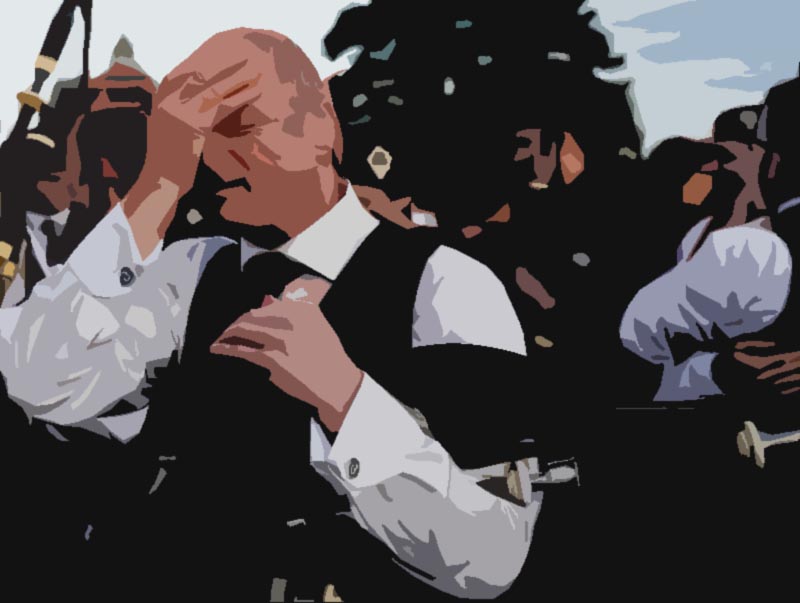Opinion: Association leaders who haven’t competed with intensity simply can’t understand

Editor’s note: pipes|drums is utterly independent of any association, organization or other business. Unless noted, articles do not speak for any other organization or person. The only things we sell are advertising and subscriptions, and all proceeds from those sources are invested in the publication and nonprofit or charitable causes that are also for the good of piping and drumming. We believe in the fundamental tenet of free and fair speech. Without exception, every article, video or other piece aims to contribute positively to piping and drumming and foster constructive dialogue. We welcome disagreement and, also without exception, we invite our readers to offer their fair comments. Any opinions expressed are those of the publication or contributing authors.
Since the World’s judging debacle remains unclarified and essentially one giant mystery destined to be swept under an increasingly filthy rug, we’ve been thinking more than ever about how competing pipers and drummers are treated – or mistreated – by some associations.
How can it be that an organization like the Royal Scottish Pipe Band Association can summarily decide to alter its rules at the World Pipe Band Championships – the biggest and most-watched event of the pipe band year – without being crystal clear as to what happened and how they arrived at their unprecedented decision to throw out the results submitted by esteemed Grade 1 Friday MSR piping judge Nat Russell?
More than two months later, we still don’t know any more than what was included in the association’s ambiguous and confusing statement to the 16 bands vying for the most coveted and exclusive prize in pipe bands, which is to say nothing.
How can they so ignore the wishes of their passionate, compelled, and not a little obsessed members?
The answer we believe is this:
Associations led and controlled by non-competitors don’t understand how important this is to the members they’re supposed to represent.
Our avocation hobby is so strangely intense that you can only appreciate what we go through if you have lived, breathed, eaten, and slept the pain and investment, the thrill and the agony, the incessant masochistic self-flagellation affliction of intense competition repeatedly for many years.
You simply can’t have the empathy and understanding required to make good decisions unless you’ve done the competing business for many years.
Because they have not done it, they can’t appreciate it, so they treat the competitors with a cavalier, it-doesn’t-matter attitude.
We have seen this lack of empathy through the ages. It almost always comes down to non-competing or inexperienced players or non-players controlling and often exploiting the competitors.
Because they have not done it, they can’t appreciate it, so they treat the competitors with a cavalier, it-doesn’t-matter attitude.
By sweeping the 2023 World’s issue under the rug, the RSPBA has done a grave disservice to its members and the piping and drumming community, bullying us once again like a bunch of weakling shmucks.
We can only conclude that the organization, as usual, assumes it will all blow over, and its members and guests will come crawling back, cap in hand.
And why shouldn’t they? It’s what competitors have done since the first organized competitions were held 300-odd years ago. They see us as being so grateful for a place to play that we will never demand change. Never mind voting with our feet by not patronizing events that are designed primarily to exploit those making the product they sell; most of us are afraid even to attend, much less vote at, AGMs.
The people in positions of power in the RSPBA have never really lived and breathed competition like their members have. They don’t have the empathy required to understand that you simply can’t do the things you do.
We bring the shabby treatment on ourselves. Rather than encouraging seasoned competitors to stand for election to influential association roles, they’re dissuaded from participating because it’s just so damn miserable a thing to do. Did the RSPBA even consider an experienced competition piper or drummer for the Executive Officer or other roles it has had such a hard time filling? As with most things RSPBA, we don’t know. But if history is an indication, the answer is no. Remarkably, the organization has never put actual seasoned competitors with the required business acumen and experience in those positions. That would risk being empathetic to the playing members. Can’t have that.
Fortunately, most associations outside of the UK are led by former players, most of whom have competed for many years at the highest levels. They understand what the members go through because they’ve done it.
Exploitation of musicians has gone on as long as there has been music performed for audiences. Pipe bands are just part of the mistreatment. “We just want to make our music,” is the password phrase for record labels and music managers to exploit musicians for their benefit. Time and time again, we see musicians who gain popularity suddenly realize that they were duped into signing on to a corrupt system. When they wise up, they get legal counsel, and they try to rectify the malfeasance. Usually, it’s too late to revise fine-print contracts they signed in a bar or over an impressive lunch, but with wisdom and a bit of luck, they get the proper counsel and sign a new deal without the fine-print exploitation.
Some will say we pipers and drummers can’t be compared to “real” musicians. That is simply not true. It is almost identical exploitation. To be sure, we just want to make the music we enjoy. And we’ll do almost anything to have a means to play our music for audiences. We’re afraid of demanding our rights for fear of not having an audience, so the exploitation goes on and on.
The world of solo piping used to be controlled by nincompoop “amateur” pipers – aristocrats who wouldn’t know a crunluath from a crumpet bossing around competitors who they treated like tawdry working-class performing monkeys.
That’s where pipers and drummers differ from the mainstream music world. We seem to think that competitions are organized out of the goodness of the organizers’ hearts. They don’t. They exist because they are lucrative to the organizers. The product is music. They sell it to an audience. Musicians make the product. We own it, yet we continually give it away for nothing, and we even expect less than nothing in return.
The world of solo piping in the UK used to be controlled by nincompoop “amateur” pipers – aristocrats who wouldn’t know a crunluath from a crumpet bossing around competitors who they treated like tawdry working-class performing monkeys. The exploitation of solo pipers still occurs, but at least the competitors have regained most of the control. That started with the formation of the Competing Pipers Association in the 1970s. Solo pipers now demand minimum standards and vote with their feet by not patronizing competitions that don’t adhere to modern expectations of judging and treatment.
So, it is possible to drive change. But not until we stop bringing such exploitative treatment upon ourselves. Pipe bands continually permit critical injustices and disrespect by associations to be swept under the rancid carpet. Nothing to see here. Move along, suckers.
We’re not asking for much. Just the empathy and respect we deserve and a fair share of the proceeds from the product we supply.
If only pipe bands would muster the courage to say, We’re mad as hell, and we’re not going to take this anymore.
As with every pipes|drums story, we encourage readers to express their reasonable and respectful opinions or views by using our Comments feature below. For liability reasons, these are reviewed before they are published. Comments on social media cannot be reviewed before they are posted automatically on those publishing sites, so we generally turn them off for that reason. Thank you for reading.







That’s one of the most open and honest opinion pieces that I have ever read on this site, with one caveat, there is no one named. Its just the organisation. You know, we all know who the useless administrators are, the people who are holding the organisation back, but you’re not naming them. Why?
There is a really interesting documentary being broadcast in Northern Ireland at the minute on the subject of the Irish dancing scene and the subsequent investigation into wide spread cheating between adjudicators, dance teachers, parents etc. The documentary makers then try to interview the governing organisation on their findings, and are met with a brick wall. The parents and teachers who were enthusiastically engaged in the doc at the beginning, immediately shut up shop when the cheating allegations began to appear. The similarities between the Irish dancing scene and the piping scene are absolutely astonishing. We engage in a hobby that we take extraordinarily serious, like life or death actually, yet we are administered by a cartel of amateurish bumpkins, and no one has the balls, pardon the expression, to say, up with this we will not put. Until that changes we are destined to go around in circles.
Thanks for reading and commenting, Howard. By no means are we implying that these administrators are “useless;” only that they can’t understand what their members go through because they have not lived it themselves. To answer your question, we’re thinking of past RSPBA executives such as Ian Embelton, Alison Burke, Mitchell White (?) and Bob Nicol. All, no doubt, are very good people, but, by all accounts, they are either non-players or have minimal competitive playing experience. If others in associations wonder, “Is this about me?” The answer is most likely, yes. Hope that helps.
Thank you, I know exactly what you are saying, i was not implying that all were useless, I was merely pointing out that some are, but we aren’t allowed to say that. If there is one thing we desperately miss Ian Embleton for, it is THAT VOICE, calling the results. I played in a competition pipe band for over 30 years, not G1 by the way, PM for a time, won World’s, European, British, Scottish, All Ireland, Ulster. When my band went belly up, and in subsequent years, not a single person from our association, NI, has approached me or any of my experienced band colleagues to ask for any advice or guidance on how best to organise an association that meets the needs of its most valuable asset, its players. They prefer their little cliques of yes men and women, who won’t ask any awkward questions.
It’s a fine line to tread to hold an organization’s personnel to account and making it impossible for an organization to attract and retain people who are competent and committed to acting in good faith. The risk in a very real way is that those few and highly sought individuals will go elsewhere with d their time, energy and skills. I suspect the universe of such people is already pretty small, making it smaller risks further problems.
Indeed. But perhaps competing pipers and drummers are well conditioned to taking constructive criticism. They subject themselves to that with their music throughout their lives, after all. The roles are not for the thin-skinned. The central point of the piece is that if you’ve lived competitive piping and drumming, you can apply that understanding and empathy to the roles. Without that experience, it’s impossible to be entirely empathetic to what the members go through . . . or subject themselves to.